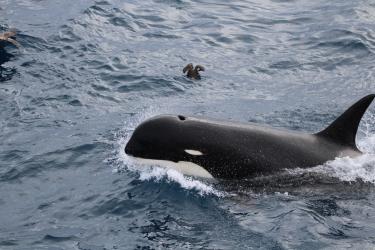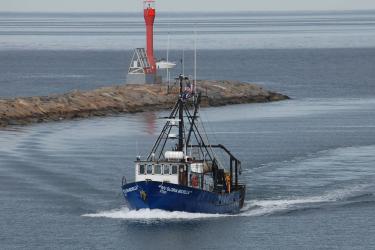Marine mammals and some fish and invertebrates produce and listen for sound in the ocean. In an environment where vision is limited, hearing is one of the most important senses. These animals rely on sound for navigating, socializing, establishing dominance, attracting mates, avoiding predators, and finding food.
Our team uses passive acoustic monitoring to study these animals. We deploy hydrophones (underwater microphones) in different regions of the ocean and record sounds. We study the acoustic data we collect to identify where and when different species are present and how they might be using sound to survive in the ocean. This information is important for helping us make decisions about how to protect our marine populations and gain a deeper understanding of their behavior.
Passive Acoustic Technologies
Acoustic technologies allow us to hear what we cannot see. Scientists used to be constrained to going out to sea to observe marine animals visually. Now, we can combine those visual and acoustic data to provide more information about animal presence, movement, and behavior when visual data collection is limited (nighttime or during the winter months or bad weather).
We work closely with acoustic technology developers to ensure we are using and providing feedback on the technologies that best suit our research needs. Our project goals determine the types of recorders we use. For example, for long-term acoustic monitoring at specific sites, we use bottom-mounted hydrophones that are anchored to the seafloor and stay there for 6 months to a year. For acoustic monitoring over a larger region to assist aerial or shipboard surveys, we use autonomous ocean gliders. They can stay out for up to 3 months and be controlled by operators from shore. Our team uses technologies including hydrophones that are:
- Mounted on the seafloor (bottom-mounted)
- Towed off the stern of research vessels (towed array)
- Mounted on autonomous ocean gliders and moored surface buoys
- Attached to marine animals (tags)
- Mounted on drifting buoy systems
- Dropped opportunistically from vessels
More on our passive acoustic technologies used for research
Studying Marine Animals with Sound
Most marine animals that we study make unique calls or sounds that we can use to identify them by species. For example, male humpback whales produce a wide variety of moans, growls, and other calls arranged in patterns that make up their song. Some fish make grunting or knocking sounds when spawning.
We identify specific calls or sounds made by different species in our acoustic recordings. This provides vital information about where those populations are feeding, breeding, or migrating. We share this information to improve how we protect critical habitat for these marine animals. This information is especially important for mitigating threats to endangered marine species.
How we study marine mammal acoustics
How we study fish and invertebrate acoustics
Studying Noise in the Ocean
Studying the underwater noise conditions of the marine environment is just as important as studying the sounds of the animals who live there. Sounds in the ocean such as thunderstorms and ship propellers are within the hearing ranges of many of the marine animals we study. These environmental and human-made sounds, combined with the biological sounds produced by animals, make up the ocean soundscape.
Environmental and human-made sounds we study include:
- Weather
- Earthquakes
- Turbine construction and operation in offshore wind energy areas
- Commercial and recreational vessels
- Seismic surveys for oil drilling
Some of the most critical ocean noise research involves studying vessel noise made by commercial ships and recreational boats. We study how vessel noise overlapping with marine mammal calls might impact the animals' behavior. We also use the sounds made by vessels to identify different vessel activities and monitor their compliance with regulations in protected areas. Most of our monitoring is conducted in U.S. waters; some projects involve international collaboration such as our vessel monitoring in the Australian Marine Parks.






